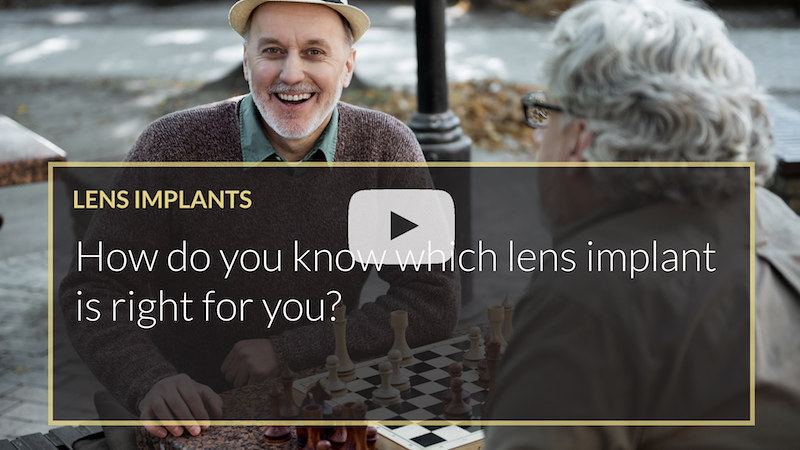
IN THIS VIDEO, PROF MOHAMMED MUHTASEB EXPLAINS HOW YOU CAN KNOW WHICH LENS IMPLANT IS RIGHT FOR YOU
How do you know which lens implant is right for you?
When patients come for their first consultation, they often don’t know what lens is appropriate for them. In most cases, patients think there’s only one type of lens that is available. Part of the consultation is to make the clinical assessment, and determine what the problem is, assess the patient’s lifestyle, hobbies, interests, and how their symptoms are affecting their overall life.
We must make time for a detailed explanation regarding the variety of available lens choices. That includes monofocal lenses, multifocal lenses and toric varieties. Then we go on to discuss the advantages and disadvantages of each, so the patient has a clear idea of what their visual life is going to be like after the surgery. In particular, whether their vision will be aimed to give them good distance vision, or near vision with a monofocal lens and glasses. Or whether they choose to have a multifocal toric lens which can achieve very good vision at far, near and middle distance without glasses.
Don’t let post-COVID cataract queues delay you from getting the treatment you need. Book a call with Cat today
Speak with us over the phone, and get a clear answer on your cataract surgery options from the comfort of your home. You’ll also discover the little known possibility of fixing your reading and/or distance vision at the same as you fix your cataracts. Book your call above today.
The discussion takes quite a bit of time, as we go into quite some detail. I find that the majority of patients are very pleasantly surprised to know that there’s a range of lenses available to them that they weren’t aware of at all before they came to the consultation.
Occasionally, a patient will have been told about some different varieties of lenses by their optometrist, or they may have met someone socially or been recommended by a friend that’s had surgery with me previously. But usually, patients don’t know about the range of choices.
Once I get an understanding of the patient’s visual requirements, and we’ve discussed the risks and benefits of each, they will look to me to make a recommendation, which I’m very happy to do. I will discuss what I think may give them the outcome that is closest to what they’re looking to achieve from their preoperative situation, and we’ll make a decision and plan together before we go forwards.
I invite you to book a consultation to determine your suitability for refractive cataract surgery or refractive lens exchange. It’s the only way to determine your suitability for these procedures and to have an in-depth discussion regarding the risks and benefits of each of them. I look forward to seeing you there and taking you through the journey to achieving your desired postoperative outcome.
Share This Story, Choose Your Platform!
ABOUT THE EXPERT
Prof Mohammed Muhtaseb, FRCOphth
Consultant Cornea, Cataract and Refractive Surgeon
iLase is the private practice of Consultant Ophthalmic Surgeon, Prof Mohammed Muhtaseb. Based in South Wales, he is one of the very few ophthalmologists working in the UK who is a fellowship-trained specialist in Cornea, Cataract and Refractive Surgery. He holds full specialist registration with the General Medical Council and was appointed as a Consultant in the NHS in 2006.




